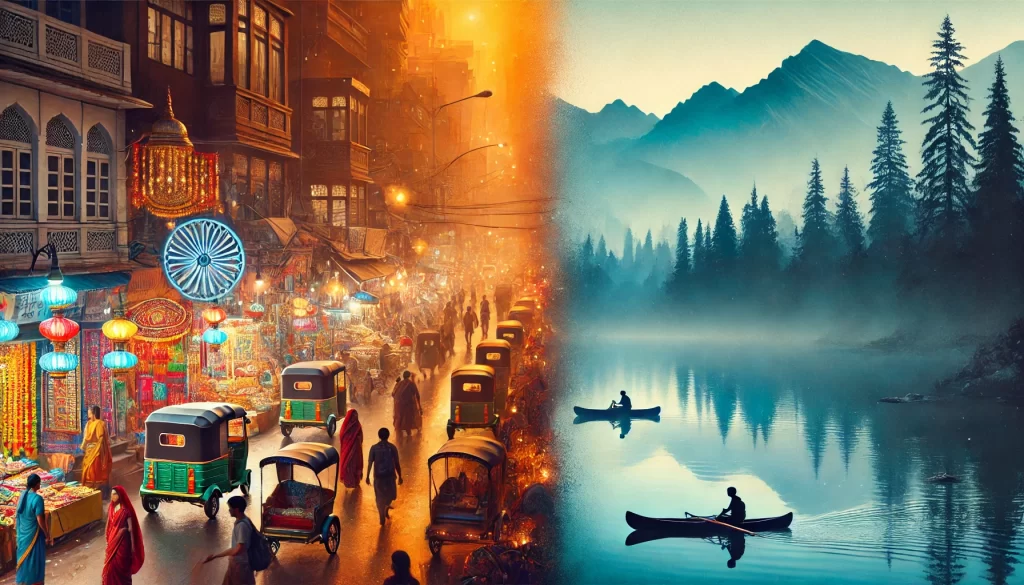
Every time I come to India, I feel it before I can name it – the sheer intensity of everything.
The moment I step off the plane, it’s as if the world has been turned up to full volume. The air is thick with voices, movement, honking, distant music, and the occasional burst of laughter from a group of people sharing a moment on the curb. The colors seem brighter, the streets more alive, and the spaces between people almost nonexistent. It’s not overwhelming in a bad way, but in a way that demands something of me.
My senses have no choice but to engage.
And yet, in the back of my mind, I know that in a few weeks, I’ll step off another plane into the crisp quiet of Canada. The contrast always takes a moment to process. The streets will be wide, the air still, and the space around me almost startling in its emptiness. No one will brush past me in a hurry, no car horns will create an impromptu rhythm, and I’ll be able to hear my own footsteps. It’s a different kind of presence – one that I appreciate, but one that feels almost unnatural after weeks of immersion in India’s relentless energy.
I’ve never seen these two worlds as competing. India shaped me, gave me my foundation, and taught me how to navigate complexity. Canada gave me the space to build, to think, to structure my life in a way that feels intentional. I’ve always considered this duality a gift, but this recent trip to India has made me realize something deeper – it’s not just a cultural or lifestyle shift. It’s a neurological one. The way my brain processes the world has to adjust between these two environments, and that adjustment takes a significant amount of effort and energy.
India doesn’t let you be passive.
You have to be fully present. Walking through a busy market, you don’t just look – you absorb. The colors of fresh fruits, the movement of people weaving effortlessly around one another, the shopkeepers calling out to customers, the layers of scent from street food stalls and the comforting aroma of spices and freshly brewed chai in the air. It’s a complete sensory, auditory, and spatial overload. There’s no room for autopilot.
Life demands your attention in a way that is both exhilarating and exhausting.
Canada, by contrast, allows the mind to exhale. The rules are clear, the space is structured, and silence isn’t rare – it’s the default. I don’t have to tune my ears to separate one conversation from another. I don’t have to calculate my next step based on the movement of a multitude of people around me. I can just be. And that ease, that lack of constant negotiation, is something I never truly appreciate until I leave it.
This writeup isn’t about preference – it’s about contrast. It’s about the cognitive load of switching between two completely different modes of existence. In India, my mind is always sorting, filtering, adjusting. In Canada, it’s conserving, structuring, planning. Neither is better, but the shift between them is something I feel more acutely with every trip. It’s not just jet lag – it’s sensory lag.
I think about this in the context of adaptability. We often talk about resilience in terms of emotional strength or strategic thinking, but rarely do we acknowledge the mental toll of adjusting to environments that demand different versions of ourselves. It’s easy to assume that stress comes from work, from decisions, from responsibilities. But sometimes, it’s as simple as the background noise, and realities, we’ve learned to tune out – or can’t.
Before this India trip, I’ve never felt more aware of how much my surroundings shape my energy, my patience, my ability to focus. This trip has made me appreciate both India and Canada in a different way that I never did before – not because one is better, but because I now recognize how deeply our environments mold our inner rhythms, influence our resilience, and redefine what it means to truly feel alive. I know a weight will lift when I step into Canada’s quiet in a few weeks, a serene reprieve that will calm my restless mind and invites reflection. And yet, even as I anticipate that tranquil release, I also know I’ll deeply miss the vibrant pulse of India – the way its relentless energy awakens every fiber of my being, leaving an indelible mark on my spirit.
I know I’ll yearn for India’s singular vibrancy – the pulse that awakens my spirit and leaves an indelible mark on my soul everytime I spend time here.
Maybe that’s the real lesson – not just in how we adjust, but in how we recognize the invisible shifts happening within us. The spaces between the noise and the silence, between movement and stillness, between immersion and detachment – those are the places where we come to understand ourselves the most.